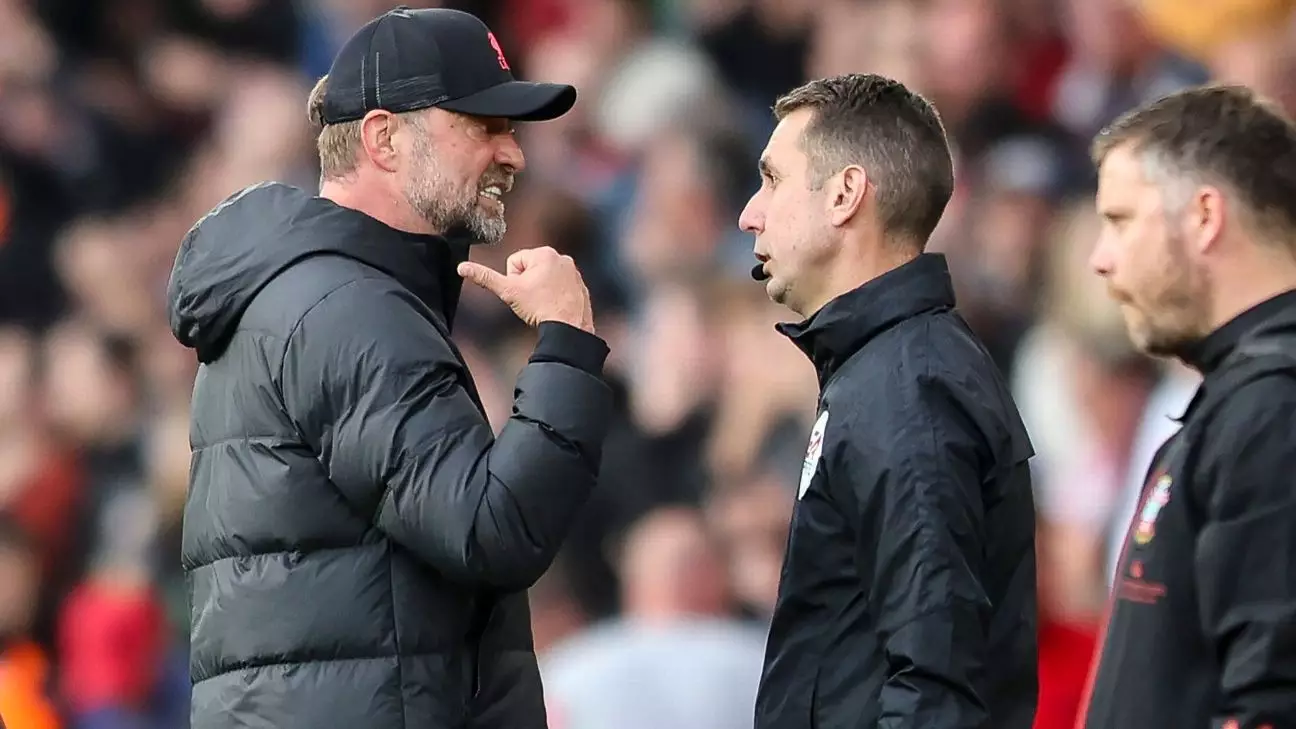The world of sports often paints a picture of rigorous competition and intense passion, but it is not without its share of controversies. Recent events surrounding Premier League referee David Coote have brought to light the importance of professionalism and the consequences of impropriety in officiating. Coote’s suspension pending an investigation into disparaging remarks made about Liverpool and their former manager, Jürgen Klopp, raises a multitude of questions regarding the accountability of referees and the impact that personal biases may have on their officiating.
The catalyst for Coote’s current predicament was the emergence of video clips on social media, wherein he was observed making unprofessional comments about Liverpool FC and Klopp. During what appears to be a casual conversation with an unidentified accomplice, Coote’s comments reflected a blatant lack of respect for both the club and its former manager, labeling them with derogatory terms. Not only does this behavior compromise the integrity that is expected from someone in his position, it also highlights a critical issue: the potential for personal opinions to cloud professional judgment.
As a referee, Coote’s role is to uphold fairness and impartiality on the pitch. By expressing sentiments that align more closely with a fan’s perspective, he inadvertently undermines not only his authority but also the credibility of the officiating body he represents. The severity of the situation becomes starkly evident when one considers that referees hold a vital position. They are the arbiters of the game, expected to remain neutral regardless of personal affiliations or grievances.
In light of the incident, the English Football Association (FA) has stated it is aware of the situation and is actively conducting an investigation. The Professional Game Match Officials Limited (PGMOL), which oversees officiating in English football, has also announced that Coote will not be available for selection as a referee or video assistant referee (VAR) until the inquiry concludes. This decision underlines the organization’s commitment to maintaining the credibility of officiating in football.
Coote’s near-term future in officiating hangs in the balance. If the content of the videos is verified as authentic, the potential ramifications could be severe, including a permanent end to his career at the top level. The incident serves as a critical reminder of the standards expected for referees and illustrates the consequences of failing to adhere to those standards.
The expectations for referees extend beyond simply enforcing the rules of football; they must also embody the principles of professionalism, integrity, and respect. Their decisions can significantly influence the outcome of games, and the public’s perception of the sport is intrinsically linked to their conduct. Given this context, Coote’s remarks prompt an introspective analysis of current protocols for referees, particularly surrounding their professional conduct off the pitch.
In examining the emotional investment that referees inevitably hold as fans of the sport, it raises the question: how can organizations foster an environment where referees can express opinions while simultaneously preserving the decorum that their roles demand? Perhaps more extensive training or guidelines about acceptable emotional engagement with clubs and players could mitigate future incidents of this nature.
This situation is emblematic of a broader issue within football culture—a culture that sometimes fosters a lack of accountability. Disparaging remarks from prominent figures, whether on or off the field, contribute to a narrative of disrespect that can trickle down to both fans and amateurs alike. The comments made by Coote, which included derogatory remarks about Liverpool’s supporters, reinforce stereotypes and foster division among fan bases.
The incident allows us to contemplate the potential long-lasting effects of individual behavior on the collective spirit of the sport. As discussions unfold and the investigation processes proceed, the football community must engage in constructive dialogue about accountability, respect, and the standards of conduct required from all stakeholders, referees included.
The unfolding situation involving David Coote serves as a stark reminder of the multifaceted responsibilities that come with officiating. The balance between personal opinion and professional obligation is delicate, and navigating it with integrity is essential for the promotion of a respectful sporting environment. Whether or not Coote can fulfill these expectations in the future remains to be seen, but the implications of his actions are likely to resonate well beyond the confines of the pitch.

